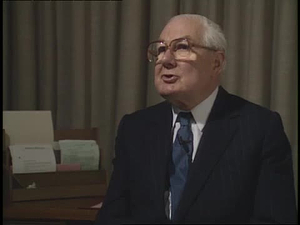War and Peace in the Nuclear Age; Interview with James Callaghan, 1987
Item Information
- Title:
- War and Peace in the Nuclear Age; Interview with James Callaghan, 1987
- Description:
-
James Callaghan, Baron Callaghan of Cardiff, was Prime Minister of the United Kingdom from 1976-1979. In the interview he describes some of the issues, disagreements and personal dynamics that arose at several NATO summits, particularly the London Summit of May 1977 and the Guadalupe Summit of January 1979. At the latter meeting, difficulties grew out of Carter's unrealistic hopes that the Europeans would support U.S. policy with a unified view, whereas the British, French and Germans each had their own approaches to the subjects of arms control and dealing with the Soviet Union. Asked about the relationship between President Carter and German Chancellor Helmut Schmidt, Mr. Callaghan describes Schmidt's growing disillusionment with Washington's economic policies, and comments on the two leaders' different personal temperaments. He denies that Schmidt lost respect for Carter. He goes on to describe both men in positive terms. On nuclear policy, Mr. Callaghan recalls Schmidt's October 1977 speech calling into question the reliability of the U.S. nuclear umbrella over Europe. He describes the SALT II process, explaining the views of the main European countries, and notes that England would have been willing to deploy U.S. nuclear weapons on its territory in the absence of an agreement from Moscow that would withdraw Soviet weapons behind the lines of Europe. He discusses the question of replacing Polaris missiles with Tridents, describes his views about the flexible response doctrine and notes his support for the current INF treaty. He admits that he did not foresee that difficulties that faced center-left administrations in Europe over the Euromissile crisis. Mr. Callaghan talks about developments since both he and President Carter left office in 1980-1981. He notes that changing leaderships can bring great swings in international relations and in public opinion, voices his belief that a steadier course would be more beneficial, especially in dealing with the Soviet Union on arms control. He recalls one of his favorite slogans in the arena of international affairs: "Our relationship with the Soviet Union should be to cooperate where we can, and compete where we must, recognizing that the systems are different."
- Author:
- Callaghan, James, 1912-2005
- Date:
-
November 26, 1987
- Format:
-
Film/Video
- Location:
- WGBH
- Collection (local):
-
American Archive of Public Broadcasting Collection
- Series:
- WGBH > War and Peace in the Nuclear Age
- Subjects:
-
Global Affairs
Military Forces and Armaments
Intermediate-range ballistic missiles
Trident (Weapons systems)
F-111 (Jet fighter plane)
SS-20 Missile
Strategic Arms Limitation Talks II
Soviet Union. Treaties, etc. United States, 1987 December 8
Pershing (Missile)
Polaris (Missile)
London Economic Summit (1984)
United States
Great Britain
France
Germany
Soviet Union
Afghanistan
Cruise missiles
Flexible response (Nuclear strategy)
SS-4 Missile
SS-5 Missile
Strategic Arms Limitation Talks
Euromissiles
Carter, Jimmy, 1924-
Reagan, Ronald
Brezhnev, Leonid Il'ich, 1906-1982
Giscard d'Estaing, Valery, 1926-
Schmidt, Helmut, 1918 Dec. 23-
Ford, Gerald R., 1913-2006
Gelb, Leslie H.
North Atlantic Treaty Organization
International Relations
Nuclear weapons
Neutron bomb
Nuclear arms control
Nuclear Disarmament
- Extent:
- 00:18:22
- Link to Item:
- https://americanarchive.org/catalog/cpb-aacip-15-5m6251fp2n
- Terms of Use:
-
Rights status not evaluated.
Contact host institution for more information.
- Publisher:
-
WGBH Educational Foundation




